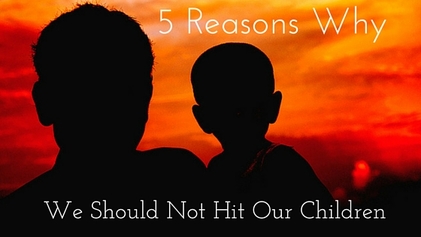 "Childhood Memory" by SAM Nasim, Flickr.com This post was originally published in Practical Psychoanalysis Blog @ PsychCentral
"Childhood Memory" by SAM Nasim, Flickr.com This post was originally published in Practical Psychoanalysis Blog @ PsychCentral Walking around the tourist filled streets of my home town, Burgas, I found myself feeling nostalgic yet sad. Nostalgic for the culture I left behind when I moved to the US and sad for its shortcomings in relationships and raising children. Having visited plenty of playgrounds and overheard a number of adult-child conversations, I came up with the idea of a blog posts on the impact of hitting children.
Whatever the case may be, this blog posts is for everyone, who has any experience with hitting or being hit. Here are 5 reasons why we should not hit our children:
Reason #1. Hitting teaches children that it's okay to hit. As adults and educators for our children, we are their role models, who show them how to handle and express their emotions. If we hit when we get angry at our child, we teach them that hitting is an okay response to feeling angry or frustrated. Children, especially boys, who are being hit at home are often the ones, who get into fights at school or end up in risky, delinquent relationships.
Reason #2. Hitting children impacts their self-esteem. Physical violence and aggression are a sign of low self-esteem, lack of self-control and feelings of helplessness. When we hit our children, we non-verbally communicate to them that they are not worthy of our love, care and approval, creating a sense of insecurity, lack of positive self-image and low self-esteem.
Reason #3. Hitting creates angry, violent or depressed adults with difficulties in their relationships. When the people, who are supposed to care for you hit you, yell at you and put you down, it is very difficult to grow up a stable, secure and confident young person. Often, the exact opposite happens - people grow up to be socially withdrawn, anxious, sad, violent or angry, with difficulties forming and maintaining meaningful adult relationships. Usually, unless you examine the traumatic past experiences in therapy, it is unlikely for things to change on their own.
Reason #4. Children that have been hit often end up hitting their own children or choosing abusive partners. Unfortunately, children, who have been hit will often do the same years later when they grow up and raise their own families. It is not unusual for children of abusive parents to unconsciously choose an abusive partner, thus recreating a traumatic childhood experience in their adult lives. Unless interrupted, this pattern can continue across generations of generations of families.
Reason #5. Excessive corporal punishment often results in mental health issues later in life, the most common ones being substance abuse, depression and anxiety. Of course, every person is different and just because you experienced corporal punishment, doesn't mean that you will end up with serious mental health problems. The excessive use of corporal punishment, however, classified as physical abuse does have significant consequences for adult mental health.
If you have a personal experience with hitting or being hit, share your story in the comments section below.
For more articles on common mental health issues, affecting you and your family, subscribe to Mental Health Digest and get the latest issue emailed to you today by leaving your name and email address in the contact form here.
Do you have questions? Found this article interesting? I would love to hear from you.



 RSS Feed
RSS Feed